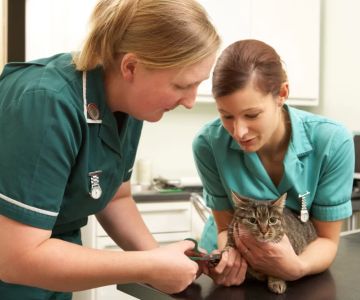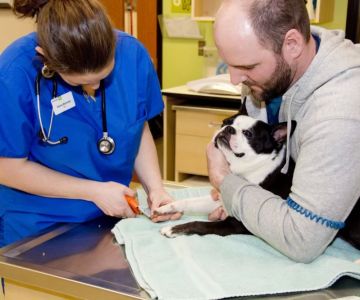What to Major in to Become a Veterinarian
Becoming a veterinarian is a dream career for many animal lovers, but it requires a significant amount of dedication and education. If you're passionate about animals and have the desire to help them, the path to becoming a veterinarian can be both rewarding and challenging. One of the most common questions prospective veterinarians ask is, "What should I major in to become a veterinarian?" In this article, I'll guide you through the educational requirements and suggest majors that will prepare you for this fulfilling career.
1. Understanding the Educational Path for Veterinarians
Becoming a veterinarian typically requires several years of education. The journey begins with a bachelor's degree, followed by veterinary school, and then licensing to practice. Veterinary schools are competitive, and they look for applicants with a strong academic record, relevant experience, and an in-depth understanding of animal science.
In my experience, aspiring veterinarians must be prepared to study a range of subjects, including biology, chemistry, and animal sciences. It is important to understand that becoming a veterinarian is not a quick process—most students spend at least eight years in higher education, with four years spent on a bachelor's degree and four more in veterinary school.
2. Top Majors for Aspiring Veterinarians
While there are no specific "vet school majors," certain degrees provide an excellent foundation for veterinary school. The following majors are the most commonly recommended for those planning to become veterinarians:
- Animal Science: This is by far one of the most popular and relevant degrees for future veterinarians. It covers various aspects of animal biology, behavior, and health, which will be beneficial throughout veterinary school.
- Biology: Biology is another solid option as it provides in-depth knowledge of living organisms and their processes. Many veterinary schools require biology courses, so it’s a natural fit for pre-vet students.
- Pre-Veterinary Studies: Some universities offer specific pre-veterinary programs designed to prepare students for veterinary school. These programs often incorporate courses in animal science, biology, chemistry, and physics, making them highly suitable for aspiring veterinarians.
- Chemistry: Veterinary medicine heavily relies on understanding chemical processes, from medications to bodily functions. A chemistry major can provide students with a strong background in biochemistry and pharmacology, which are essential for a career in veterinary medicine.
- zoology: Zoology, the study of animals, is another great choice for those interested in veterinary care. This major dives deep into animal physiology, ecology, and genetics, which are important subjects for future vets.
3. Supplementing Your Major with Animal Experience
While choosing the right major is important, gaining hands-on experience with animals is just as crucial. Veterinary schools look for applicants with substantial practical experience, so it’s essential to get involved with animal care during your undergraduate years. In my journey, volunteering at local animal shelters and working as an animal assistant helped me build the experience I needed to stand out during the admissions process.
Aside from volunteering, internships, part-time jobs, and working with veterinarians can provide valuable insights into animal care. The more experience you can gain, the better prepared you'll be for both veterinary school and your future career as a vet.
4. The Importance of Science Courses
No matter what major you choose, science courses will play a significant role in your academic journey. Veterinary schools emphasize the importance of science in their admissions process. In fact, nearly all veterinary programs require a background in chemistry, biology, and physics. I found that taking advanced courses in these subjects not only strengthened my application but also gave me the knowledge I needed to succeed in veterinary school.
Some of the most important science courses for aspiring veterinarians include:
- Organic Chemistry: A key course for understanding the chemical structure of drugs and biological molecules.
- Physics: Vital for understanding the mechanics of how animals' bodies function.
- Microbiology: Understanding pathogens and diseases is essential for treating animals.
5. Additional Skills for Aspiring Veterinarians
In addition to academic excellence, becoming a veterinarian requires developing soft skills like communication, empathy, and problem-solving. Veterinarians need to effectively communicate with pet owners, colleagues, and staff. Over time, I learned that being able to explain complex medical issues in simple terms was just as important as having technical knowledge.
Building emotional intelligence is another important skill. Veterinarians often deal with pet owners who are stressed or upset about their animals’ health. Having the empathy to understand their concerns and offer compassionate solutions is crucial in this line of work.
6. Considerations When Applying to Veterinary Schools
When applying to veterinary schools, the competition can be fierce. Each school has its own specific requirements, so it’s essential to research them thoroughly. Many veterinary schools require a certain number of volunteer hours, veterinary experience, and a high GPA, especially in science courses. During my application process, I also had to submit a personal statement, recommendation letters, and take the GRE (Graduate Record Examination).
It’s also worth noting that some veterinary schools offer specialized tracks, such as small animal care, large animal care, or exotic animal care. Depending on your career goals, choosing a program that aligns with your interests is crucial.
Conclusion: The Road to Becoming a Veterinarian
Becoming a veterinarian is a rewarding career path that requires dedication, years of education, and a passion for animals. The right major plays a critical role in preparing you for veterinary school, but gaining real-world experience is equally important. Whether you choose to major in animal science, biology, or chemistry, remember that success in veterinary school is not only about your academic performance but also your commitment to learning and growing as an animal care professional.
If you’re serious about pursuing this career, I encourage you to explore all the available options and consider visiting institutions like Fred Miller Lawyer to learn more about the steps you need to take and gain helpful resources. Start today and take the first steps toward making your dream of becoming a veterinarian a reality!
SEO Title: What to Major in to Become a Veterinarian SEO Keywords: veterinarian education, what to major in to be a veterinarian, veterinary school prerequisites, veterinary major options SEO Description: Learn the best college majors for becoming a veterinarian. Discover the educational path, relevant experience, and skills needed for a successful veterinary career.










